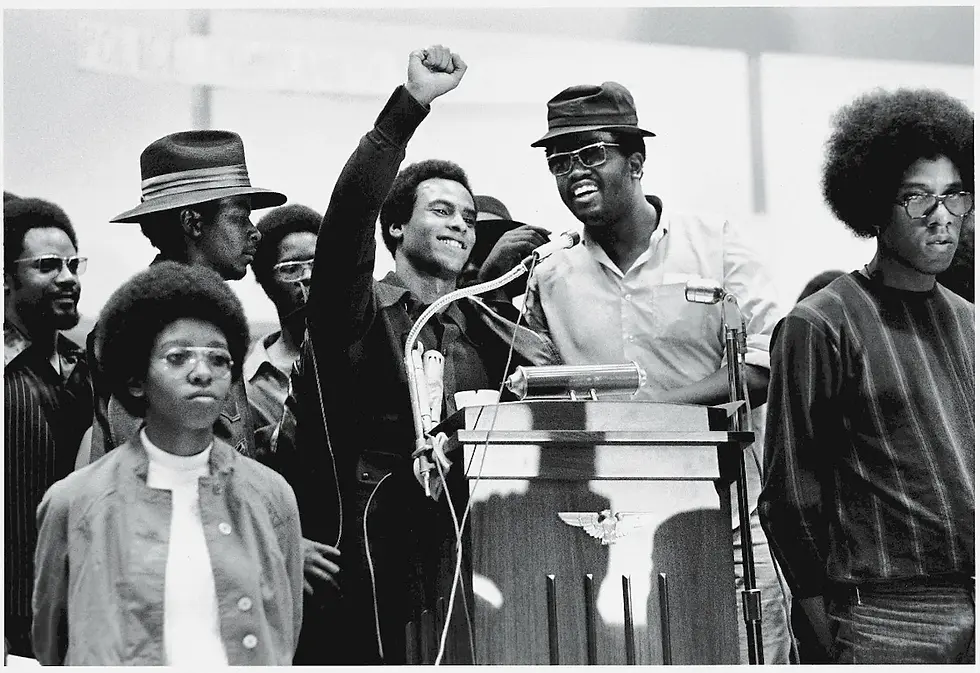Huey P. Newton: The Revolutionary Mind Behind the Black Panther Party

In the turbulent 1960s, Oakland became the backdrop for one of the most significant political movements of the era. Huey P. Newton was at the forefront, using his intellect and determination to challenge racial injustice and advocate for African American empowerment. His rise from a struggling student to the leader of the Black Panther Party is a compelling story of resistance, resilience, and revolutionary thought.
Early Life and Education
Huey Percy Newton was born on February 17, 1942, in Monroe, Louisiana, at a time when the American South was rife with racial violence. Named after Louisiana's populist governor, Huey Long, Newton grew up in an environment where racial injustices were not just historical grievances but everyday realities. His family, like many African Americans, migrated to Oakland, California, during the second wave of the Great Migration, seeking opportunities beyond the limitations of the segregated South.
Despite a troubled childhood that included multiple arrests, Newton managed to navigate his way through the Oakland public school system. However, he struggled with reading, a deficiency he later corrected by teaching himself, using Plato’s Republic as his guide. This foundational text not only provided him with literacy but also introduced him to ideas that would later shape his revolutionary ideology. Newton later attended Merritt College, where he earned an Associate of Arts degree in 1966 and was heavily influenced by the works of Karl Marx, Vladimir Lenin, Malcolm X, and Che Guevara.

The Formation of the Black Panther Party
In October 1966, Newton co-founded the Black Panther Party for Self-Defense alongside Bobby Seale. The Party, designed to address the systemic oppression and police brutality faced by African Americans, quickly gained national and international attention. Newton served as the Party’s Minister of Defense and was instrumental in drafting the Ten-Point Program, a manifesto that called for self-determination, employment, education, housing, and an end to police brutality.
Under Newton’s leadership, the Black Panther Party launched over 60 community support programs, later renamed ‘survival programs’ in 1971. These initiatives included food banks, medical clinics, sickle cell anemia testing, prison busing for inmates’ families, legal advice seminars, clothing banks, and even an ambulance service. Among these programs, the Free Breakfast for Children initiative stood out, feeding thousands of impoverished children across the United States in the early 1970s.
Newton also co-founded the Black Panther newspaper, which quickly became one of the most widely distributed African-American publications in the country, offering a platform for the Party’s ideology and critiques of systemic injustice.
The Confrontation with Law Enforcement
Newton’s role as a revolutionary did not come without peril. On October 28, 1967, he was involved in an altercation with Oakland police officers that resulted in the death of Officer John Frey and injuries to both Newton and another officer. Newton was convicted of voluntary manslaughter in 1968 and sentenced to 2 to 15 years in prison. His conviction became a rallying point for the Free Huey! campaign, which gained widespread support from civil rights activists. In May 1970, his conviction was overturned, and after two retrials resulted in hung juries, the charges were dropped.

Academic Pursuits and Political Ideology
Newton’s intellectual pursuits did not wane despite his legal battles. He continued his education and earned a PhD in social philosophy from the University of California at Santa Cruz in 1980. His dissertation, War Against the Panthers: A Study of Repression in America, critically examined the United States government’s efforts to dismantle the Black Panther Party through surveillance, infiltration, and outright violence.
Newton’s ideology evolved over time. While he initially aligned himself with Marxist-Leninist thought, he later developed what he termed ‘revolutionary humanism.’ He was skeptical of religious dogma, but after the Black Panther Party’s dissolution, he found himself drawn to Christian theology, eventually attending the Allen Temple Baptist Church in Oakland.

Controversy and Decline
By the late 1970s and early 1980s, Newton’s life took a darker turn. The decline of the Black Panther Party coincided with personal struggles, including substance abuse and increasing paranoia. He was accused of various crimes, including the murder of Kathleen Smith and the mysterious death of Betty Van Patter, though he was never convicted in either case. His growing erratic behavior led many former supporters to distance themselves from him.
Newton’s involvement with the Black Panther Party also made him a target of political and criminal factions. By the time he was arrested for embezzlement related to Panther-founded Oakland Community School funds in 1982, the Party had all but dissolved. Although the charges were dropped years later, Newton’s reputation had been significantly damaged.
The Murder of Huey P Newton
On August 22, 1989, Newton was gunned down in Oakland, California, by Tyrone Robinson, a member of the Black Guerrilla Family prison gang. Robinson later admitted to the murder, stating that he sought to advance his standing within the gang.
Newton’s funeral was attended by hundreds, a testament to his enduring influence in the struggle for Black empowerment. In 2021, the city of Oakland honored his contributions by erecting a bust in his memory near the street where he was murdered, as well as renaming a section of 9th Street as Dr. Huey P. Newton Way.